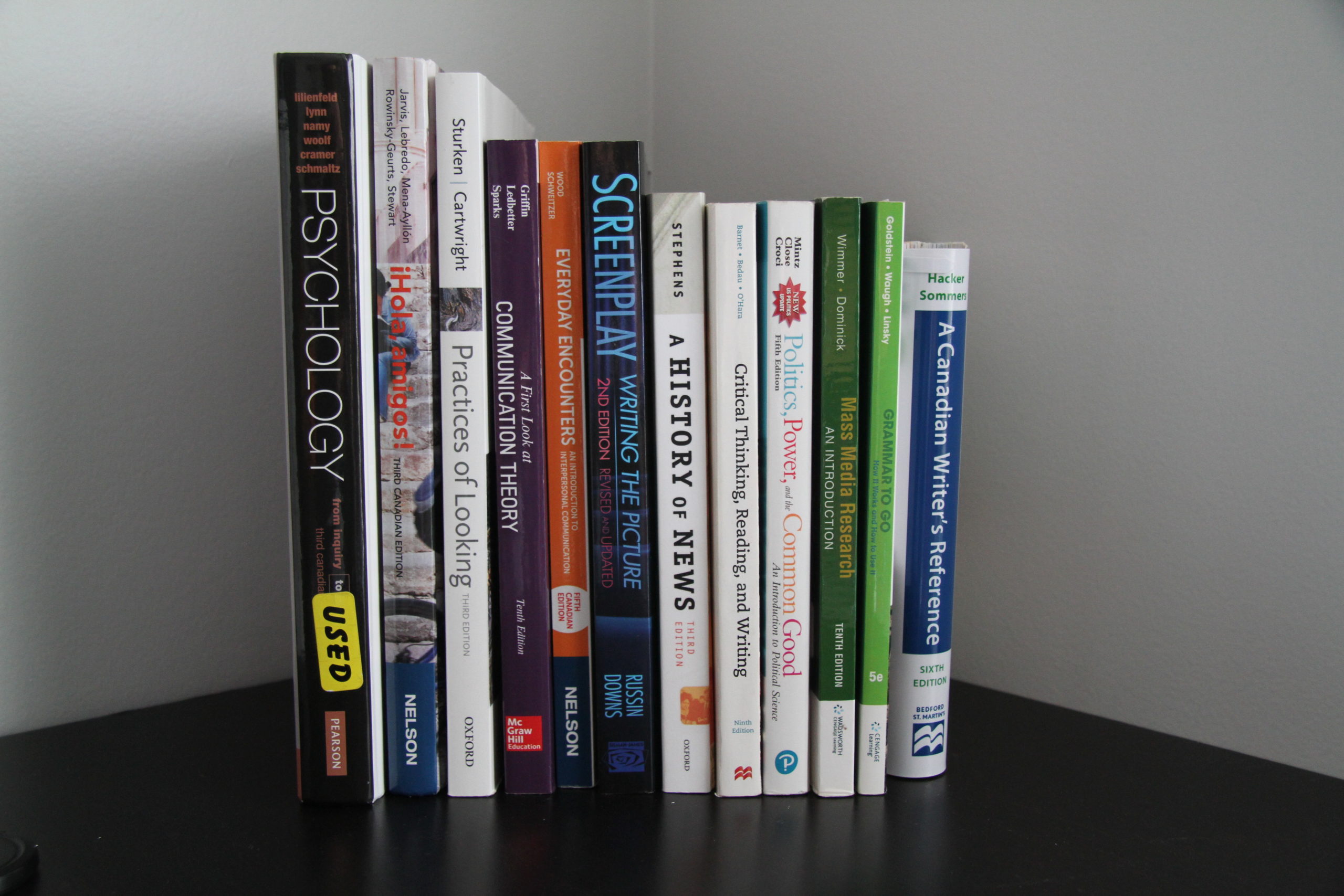Next to tuition, textbooks may very well be the biggest cost of post-secondary education. This is not surprising to anyone, especially not students. The reality is these high costs for books have been a concern for so long that it has become a fact of life. This, combined with the fact that they are a necessity for higher learning, means we are at the mercy of those who sell them, but how much are we really paying for books anyway?
This isn’t an easy question to answer. The costs of books depend greatly on the program, the university, and where you purchase them. According to an article in Maclean’s from 2017, book expenses per student range from about $400 to $1,000 per year, depending on school and program. Over the span of a four-year undergrad, this could add an extra $4,000 to education expenses. If you happen to be a student on a very tight budget, this becomes a problem.
The question still remains: why are books so expensive? Some students have theories of publishing companies making mountains of money off the backs of students, others have visions of professors sitting beachside, reaping the benefits of the fortunes they made from royalties. Neither is accurate, though many professors and publishers likely wish they were.
In an interview with one of MacEwan University’s very own journalism professors, who just happens to have written a textbook, Dr. Brian Gorman helped to dispel some of these theories. He explained that money is not at all the reason why professors write textbooks. Instead, they do so because it helps their careers. In fact, what they do make in book sales is shocking. “You can pay 50 or 60 (dollars) a textbook and the author is getting maybe a dollar,” Gorman stated.
“You can pay 50 or 60 (dollars) a textbook and the author is getting maybe a dollar.”
Dr. Brian Gorman
This leaves the other possible villain: the publishing company. However, a closer look finds that although money is being made, they may not be the evil masterminds students love to envision. As Gorman explained, publishing companies pay a significant amount for printing costs and therefore make more profits from novels than textbooks. When producing a large number of books, as is often the case with bestselling novels, companies can request the printing of so many books that it lowers the overall cost of each book due to pricing structure. This is not the case with textbooks that sell far fewer copies. This increase is reflected in the price we see in stores.
Publishing companies are guilty of one thing, and that is continually releasing new editions in order to push sales of new books and discourage students from buying second- hand copies from their peers. Ask any veteran student and they will tell you that often, updated editions have few differences and are mostly a way to sell more books.
So no one is getting rich fast on textbooks. Now what? There are several ways to lower book costs to make it far more affordable.
A 2017-18 survey by the Students’ Association of MacEwan University (SAMU) revealed that 62.1 percent of students felt that the high cost of books is the most important cause that SAMU should be finding a solution to. Therefore, it is no surprise that Vice President Academic, Sean Waddingham is very passionate about the subject.
SAMU currently has a program called Be Book Smart that students can find on samu.ca with great tips for anyone trying to minimize the costs of books. When asked for suggestions, Waddingham was a wealth of knowledge on alternatives for purchasing books.
“I’ve gone through four years of university and I haven’t bought books the last two years unless they were ones I really wanted,” Waddingham said. “If you can’t find it anywhere else … rent one online … I like to go for zero cost, but if that’s not possible then buy used or get an older edition.”
So no one is getting rich fast on textbooks.
Waddingham reminds students that old editions often work just fine. He was also very excited about MacEwan working with Open Education Resources (OER), freely accessible course texts and materials that anyone can access. These will not be in effect for possibly a couple more years, but when they are, specific courses will offer their textbooks through OER’s online for free. “These sources will have no copyrights and you will always have access to them without any cost,” he said.
Waddingham also wanted students to be aware that a great way to save is to buy from each other. “We have a terrific (MacEwan Used Book Exchange) Facebook page where you can find books from other students,” he stated. This is possibly one of the best options when it comes to used books because it means huge savings to the student buying but also means the student selling is getting a fair price, which often doesn’t happen when you sell back to the bookstore.
So how can students move forward and help themselves in the maze of academic financial struggle? For one, do not mistake convenience for savings. Though in-school bookstores are very convenient, they are not always the best price option. Often the prices for the convenience are indeed higher, so avoid the lineups and costs when possible by ordering books online from sites that provide more competitive pricing. A great one is campusbooks.com, where students can sell, rent, or buy new and used books. The site even compares the prices of several other sites, saving customers time.
Next, keep those local pages in mind. On Facebook, students can find the MacEwan Used Book Exchange Facebook page, where they can buy and sell books to each other, ask about classes and professors, and sometimes kindly return lost student ID’s or share funny school-related memes. This really is a great place to start for those who want to help themselves and their fellow students out. By buying directly from students we are eliminating the middleman, in this case, book stores or websites that might charge fees.
Of course, never underestimate the power of a library card. MacEwan’s library carries several copies of older editions, and if new editions are absolutely needed, they can be taken out in two-hour increments. This may be very helpful for those wanting to confirm whether or not the new editions are very different from the older ones.
Finally, don’t forget to ask questions. Whether it is your first year or your last, we are all here to get through this academic adventure and students are pretty helpful, especially since they are all in the same boat. Ask classmates or professors if a specific book is really needed and they will usually be very honest. In fact, more teachers are trying to be flexible with books in order to make sure that students get the reading materials they need without going broke in the process. Keep in mind that SAMU is here to help students, and when it comes to being book smart, Waddingham is happy to answer any questions, so don’t be shy.





0 Comments